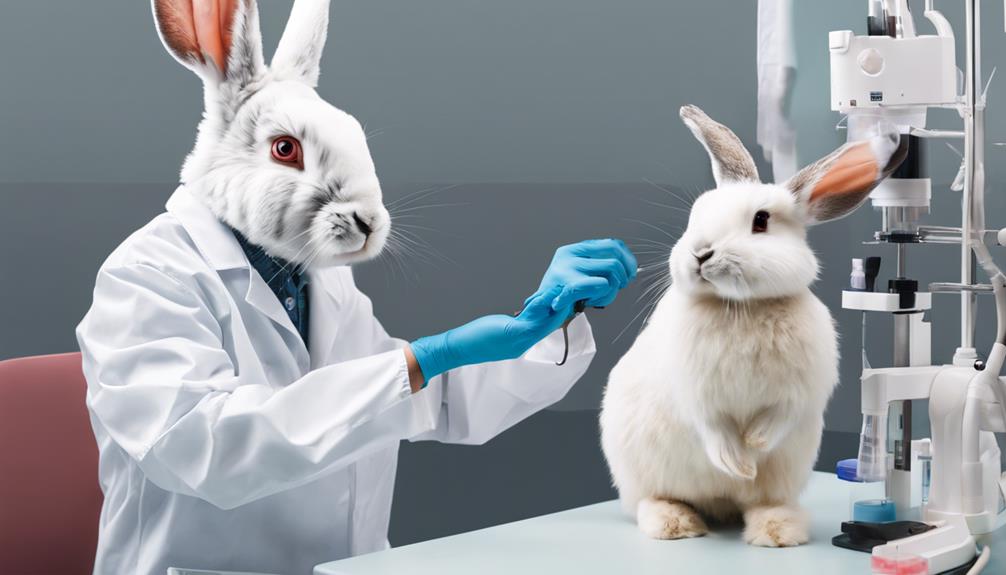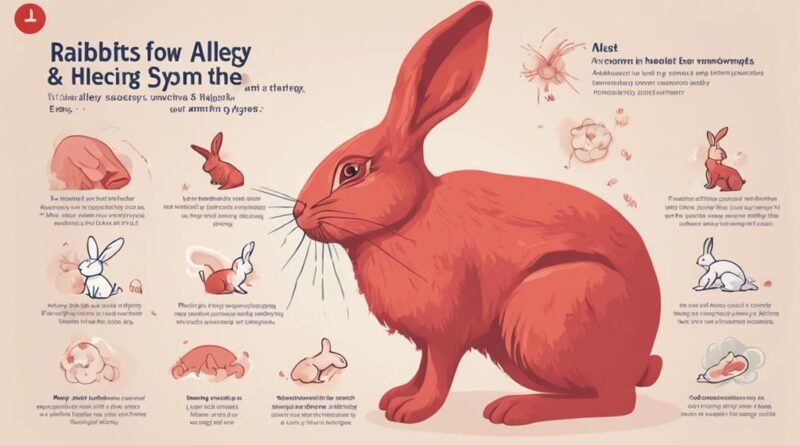Top 10 Facts: Rabbits and Human Allergy Interactions
When interacting with rabbits, be aware that their fur, dander, urine, and saliva contain allergens that can trigger reactions in sensitive individuals. Symptoms in allergic people include sneezing, nasal congestion, and itchy eyes. Allergies may develop gradually due to repeated exposure, influenced by genetic and environmental factors. Comparatively, rabbit allergens differ from those of cats and dogs. Reduce exposure by cleaning regularly with rabbit-safe products, using HEPA filters, and creating designated play areas. Management involves allergy testing, medical intervention, and understanding sensitivity levels. Living harmoniously with a pet rabbit requires bunny-proofing spaces, routine vet check-ups, and bonding activities.
Rabbit Allergen Triggers Reactions
Rabbit allergens commonly trigger allergic reactions in sensitive individuals, particularly when in close contact with rabbits or their living environments. Allergens such as proteins found in rabbit fur, dander, urine, and saliva can induce allergic responses when inhaled, ingested, or come into contact with the skin.
To prevent exposure to these allergens, it's crucial to implement proper allergen prevention strategies. This includes regularly cleaning and vacuuming living spaces, washing hands after handling rabbits, and using air purifiers to reduce allergen levels in the air.
For individuals who continue to experience allergic reactions despite allergen prevention measures, immunotherapy options may be considered. Immunotherapy, also known as allergy shots, involves administering gradually increasing doses of the allergen to desensitize the immune system over time. This treatment can help reduce the severity of allergic reactions and improve overall quality of life for individuals with rabbit allergies.
It is important to consult with an allergist to determine the most suitable immunotherapy approach based on individual allergy triggers and medical history. By understanding the mechanisms behind rabbit allergen triggers and exploring appropriate prevention and treatment options like immunotherapy, individuals can better manage their allergic reactions and enjoy interactions with rabbits in a safer manner.
Common Symptoms in Allergic Individuals
When exposed to rabbit allergens, allergic individuals commonly experience a range of symptoms that manifest in various ways. Allergic reactions to rabbits can be triggered by exposure to proteins found in their dander, urine, and saliva. Symptoms may vary in severity depending on individual sensitivity levels and exposure frequency. Environmental factors play a significant role in exacerbating symptoms, such as living in a house with pet rabbits or frequenting places where rabbits are present.
Common symptoms experienced by allergic individuals include sneezing, nasal congestion, runny nose, itchy or watery eyes, coughing, wheezing, chest tightness, and skin rashes. These symptoms typically arise shortly after exposure to rabbit allergens and may persist for a prolonged period if not managed effectively. Genetic predisposition can also increase the likelihood of developing allergies to rabbits or other animals.
Allergy prevention strategies involve minimizing exposure to rabbits and their allergens, such as keeping rabbits out of living areas, using air purifiers, and regularly cleaning living spaces. In cases where symptoms persist, seeking medical treatment is essential. Treatment options may include over-the-counter antihistamines, nasal corticosteroids, decongestants, or allergy shots (immunotherapy) for long-term management. Consulting with an allergist can help determine the most suitable treatment plan based on individual symptoms and allergy triggers.
Allergies Can Develop Over Time
Allergies can gradually develop over time due to repeated exposure to allergens present in the environment. When you encounter allergens such as rabbit dander, saliva proteins, or urine, your immune system may recognize them as harmful invaders. Genetic predisposition plays a significant role in the development of allergies. If you have a family history of allergies, you may be more prone to developing them yourself. However, environmental factors also contribute to the process. For instance, if you live in a house with rabbits or frequently visit places where rabbits are present, your chances of developing an allergy to them increase over time.
Preventive measures can help reduce the likelihood of developing allergies to rabbits. Gradual exposure to rabbits and their environment may help your immune system become desensitized to the allergens. If you suspect you may be prone to rabbit allergies due to genetic factors, taking precautions such as limiting exposure, using air purifiers, and keeping living spaces clean can be beneficial. Understanding the potential for allergies to develop over time allows you to be proactive in managing your health. By being aware of the interplay between genetic predisposition and environmental factors, you can take steps to mitigate the risk of developing allergies to rabbits.
Rabbit Allergies Vs. Other Pet Allergies
Developing allergies to various pets can differ in symptoms and triggers compared to rabbit allergies. When comparing rabbit allergies to allergies from other pets, such as cats or dogs, several key distinctions become apparent:
- Pet hair: One major difference is in the nature of the allergen itself. While rabbits do shed hair and dander that can trigger allergies, the composition of their fur proteins differs from those of cats and dogs, which may lead to varying allergic responses.
- Allergy testing: When it comes to diagnosing pet allergies, allergy testing plays a crucial role. Different allergen extracts are used for testing rabbit allergies compared to other common pet allergies, aiding in accurate identification of the specific allergen triggering the immune response.
- Symptom variation: The symptoms of rabbit allergies may manifest differently from those caused by other pets. While respiratory symptoms like sneezing and wheezing are common in both cases, the severity and timing of symptoms can vary.
- Cross-reactivity: Some individuals may experience cross-reactivity between different pet allergens. Understanding these potential cross-reactions is essential for effective management of allergies in multi-pet households.
- Environmental factors: Factors such as the pet's living environment and grooming habits can influence the level of exposure to allergens, impacting the development and progression of allergic reactions.
Reducing Allergen Exposure at Home
To minimize exposure to allergens at home, implement regular cleaning routines that target areas where pet dander and fur particles may accumulate. Start by vacuuming carpets, rugs, and upholstery frequently using a vacuum cleaner equipped with a HEPA filter to trap allergens effectively. Dusting surfaces with a damp cloth can prevent allergens from becoming airborne. Consider investing in allergen-free furniture or using allergen-resistant covers on existing furniture to reduce the accumulation of rabbit allergens.
When it comes to cleaning areas where your rabbit roams, opt for rabbit-safe cleaning products that are free of harsh chemicals and fragrances. Use mild, unscented cleaners to wipe down surfaces, making sure to pay attention to areas where your rabbit spends the most time. Wash your rabbit's bedding and toys regularly in hot water to eliminate allergens.
In addition to cleaning, ensure proper ventilation in your home to reduce the concentration of allergens in the air. Use air purifiers with HEPA filters to capture airborne allergens effectively. Consider installing an HVAC filter designed to trap pet allergens, and change it regularly to maintain its efficiency. By incorporating these strategies into your cleaning routine and home maintenance, you can create a more allergen-free environment for both you and your rabbit.
Importance of Proper Rabbit Handling
Proper handling of your rabbit is crucial for maintaining a healthy and safe interaction between you and your pet. When handling your rabbit, ensure you follow these guidelines to prevent allergic reactions and promote a harmonious relationship:
- Wash Your Hands: Before and after handling your rabbit, wash your hands thoroughly with soap and water to remove any potential allergens.
- Avoid Face Contact: Refrain from touching your face, especially your eyes and mouth, after handling your rabbit to prevent allergens from coming into contact with sensitive areas.
- Use Gloves: If you're particularly sensitive to allergens, wearing gloves while handling your rabbit can help reduce direct contact.
- Provide Adequate Ventilation: When interacting with your rabbit indoors, ensure proper ventilation to minimize allergen build-up in the air.
- Regular Cleaning: Clean your rabbit's living space frequently to reduce the accumulation of allergens like dander and fur.
Following these proper handling techniques can significantly decrease the risk of allergic reactions and create a safer environment for both you and your rabbit. Remember, prevention is key when it comes to allergy prevention, and responsible handling plays a vital role in maintaining a healthy bond with your furry companion.
Allergy Testing for Sensitivity

An essential step in managing rabbit-related allergies is undergoing allergy testing to determine your sensitivity levels. Allergy prevention starts with identifying specific allergens that trigger reactions when you come into contact with rabbits. Testing methods commonly used to assess sensitivity to rabbit allergens include skin prick tests and blood tests for specific antibodies.
Skin prick tests involve pricking the skin with a small amount of rabbit allergen extract and observing for any allergic reactions such as redness, swelling, or itching at the site. This test helps determine if your immune system reacts to rabbit proteins. Blood tests measure the levels of specific antibodies, such as immunoglobulin E (IgE), produced by your immune system in response to rabbit allergens. Elevated levels of these antibodies indicate sensitivity to rabbit allergens.
It is crucial to consult with an allergist or immunologist to interpret the results of allergy testing accurately. Based on the test outcomes, healthcare professionals can recommend personalized allergy prevention strategies, such as avoiding direct contact with rabbits, using air purifiers, or wearing masks when handling rabbits. Understanding your sensitivity levels through proper allergy testing is key to effectively managing rabbit-related allergies and minimizing potential health risks.
Impact of Rabbit Allergies on Health
How do rabbit allergies affect your overall health? Rabbit allergies can have various impacts on your health, ranging from mild discomfort to severe reactions. Understanding the health implications and available treatment options is crucial for managing these allergies effectively. Here are some key points to consider:
- Respiratory Issues: Rabbit allergies often manifest as respiratory symptoms such as sneezing, coughing, wheezing, and shortness of breath, which can affect your daily life and productivity.
- Skin Irritation: Contact with rabbits can lead to skin reactions like rashes, hives, or eczema, causing discomfort and potentially impacting your skin health.
- Eye Problems: Allergic reactions to rabbits may result in itchy, watery eyes, redness, and swelling, affecting your vision and overall eye health.
- Potential Anaphylaxis: In severe cases, exposure to rabbit allergens can trigger a life-threatening allergic reaction known as anaphylaxis, requiring immediate medical attention.
- Impact on Mental Health: Dealing with rabbit allergies can also have emotional implications, leading to stress, anxiety, or frustration due to the impact on your daily routines and interactions with pets.
To mitigate these health effects, allergy prevention strategies and lifestyle changes such as avoiding direct contact with rabbits, using air purifiers, and maintaining a clean living environment can be beneficial. Additionally, consulting with healthcare professionals for proper diagnosis and discussing treatment options like medications or allergen immunotherapy can help manage rabbit allergies effectively.
Managing Allergies With Medical Intervention

To effectively manage rabbit allergies with medical intervention, consulting an allergist for personalized treatment options is essential. Allergists are specialized physicians who can diagnose specific allergies through skin tests or blood tests. Once the allergy to rabbits is confirmed, they can recommend various medical treatments to alleviate symptoms and improve quality of life.
Medical treatment for rabbit allergies often includes antihistamines to reduce itching, sneezing, and runny nose. Nasal corticosteroid sprays can help with nasal congestion, while decongestants may provide relief from a stuffy nose. Allergy shots, or immunotherapy, can also be considered for long-term management by desensitizing the immune system to rabbit allergens.
Allergy prevention is another crucial aspect of managing rabbit allergies. Keeping rabbits out of bedrooms, using air purifiers with HEPA filters, and regularly cleaning rabbit cages and living areas can help reduce allergen exposure. Washing hands after handling rabbits and avoiding touching the face can also minimize symptoms.
In severe cases, where medical treatment and preventive measures aren't sufficient, allergists may recommend considering rehoming the rabbit to a new owner or finding alternative homes for the affected individual. It's important to prioritize health and well-being when managing rabbit allergies through medical intervention.
Living Harmoniously With a Pet Rabbit
Living harmoniously with a pet rabbit requires understanding their natural behaviors and creating a suitable environment to meet their needs. Rabbits are social animals that thrive on companionship and mental stimulation. To ensure a happy coexistence with your furry friend, consider the following:
- Bunny proofing spaces: Rabbits love to chew on things to keep their teeth in check. Protect your electrical cords, furniture, and other items by providing appropriate chew toys and securing hazardous items out of reach.
- Understanding rabbit behavior: Recognize that rabbits communicate through body language. Learn to interpret their signals to better understand their moods and needs.
- Bonding activities: Spend quality time with your rabbit to build a strong bond. Gentle petting, interactive play, and even clicker training can strengthen your relationship.
- Rabbit care basics: Provide a balanced diet of hay, fresh vegetables, and pellets. Keep their living area clean, ensuring they've ample space to hop around and explore.
- Regular veterinary check-ups: Schedule routine visits to a rabbit-savvy veterinarian to monitor your pet's health and address any concerns promptly.
Frequently Asked Questions
Can Rabbit Allergies Be Transferred From One Person to Another?
Allergy transmission from one person to another due to rabbits isn't possible.
Allergies to rabbits are caused by exposure to their dander, saliva, or urine. Genetic predisposition and environmental factors play a role in developing allergies.
Prevention involves minimizing exposure to rabbit allergens through regular cleaning, proper ventilation, and keeping rabbits out of bedrooms.
If someone has a rabbit allergy, they should take necessary precautions to manage symptoms and avoid triggers.
Are There Specific Breeds of Rabbits That Are Less Allergenic?
When looking for hypoallergenic breeds, consider crossbreeding options. Some rabbit breeds may produce fewer allergens than others due to variations in their fur and dander composition.
Can Rabbit Allergies Worsen With Age?
As you age, allergy progression can lead to increased sensitivity to rabbit allergens. Age-related sensitivities may cause existing rabbit allergies to worsen over time.
Your immune system can become more reactive to the proteins found in rabbit dander and saliva, triggering stronger allergic reactions.
It's essential to monitor any changes in symptoms and consult with a healthcare provider for proper management of rabbit allergies as you get older.
Is There a Cure for Rabbit Allergies?
If you're dealing with rabbit allergies, there isn't a cure per se, but there are possible treatments to manage symptoms. Allergy prevention strategies like keeping rabbits out of living spaces, using air purifiers, and washing hands after handling them can help.
Medications such as antihistamines or nasal corticosteroids may also provide relief. In severe cases, immunotherapy, where you're exposed to small, increasing doses of allergens over time, could be an option.
Do Rabbit Allergies Affect Children Differently Than Adults?
Allergy triggers and symptoms related to rabbit allergies may affect children differently than adults. Children tend to experience more severe symptoms such as wheezing, coughing, and skin rashes compared to adults.
Treatment options include antihistamines, nasal corticosteroids, and allergy shots. Prevention strategies involve minimizing exposure to rabbits, keeping living areas clean, and using air purifiers.
Consult a healthcare provider for personalized advice on managing rabbit allergies in children.
Conclusion
In conclusion, understanding the interactions between rabbits and human allergies is crucial for managing potential health risks. By recognizing the triggers and symptoms of rabbit allergies, individuals can take proactive steps to reduce exposure and seek medical intervention when necessary.
It's important to prioritize health while also enjoying the companionship of a pet rabbit, ensuring a harmonious and safe environment for both the pet and its owner.
